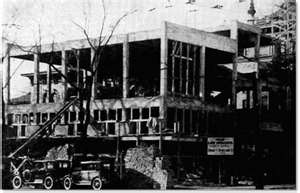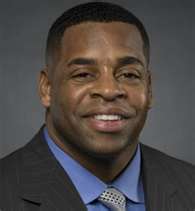Welcome to the Class of 1912

Like their counterparts of a century later, the Marquette Law School class that entered in the fall of 1912 was the third class to begin law school in a new building. Whereas the Class of 2012 was the third class to start in Eckstein Hall, those who entered in 1912 had a similar claim in regard to the Mackie Mansion, a former residence purchased by Marquette University in 1910. From 1908 until the acquisition of the new home for the school, law classes were held in the still-standing in 2012 Johnston Hall. However, within two years, overcrowded conditions necessitated a separate law school building.
The Mackie Mansion was located on the corner of 11th Street and Grand Avenue (now Wisconsin Avenue). It was set back from Grand Avenue and was situated in the spot occupied by the southern half of Sensenbrenner Hall in its current form, as viewed from 11th Street.
The 1912 class consisted of 36 full-time day students and 28 evening students. All 64 class members were males, and all but four were from Wisconsin. The four out-of-state students included day students from Menominee, Michigan and Waseca, Minnesota, and night students from the distant locales of Franklin, Indiana, and Shellyville (not Shelbyville), Kentucky.
Milwaukeeans accounted for more than 60% of the class. Seventeen day students were from Milwaukee with an 18th from West Allis. Perhaps not surprisingly, 23 of the 28 night students were from the Cream City.
The faculty in 1912 looked quite impressive on paper, consisting of Dean James G. Jenkins, a retired United States Circuit Court Judge, Secretary (Assistant Dean) Arthur Richter, a graduate of the University of Chicago Law School, the Rev. Charles B. Moulinier, S. J., the Regent of the College of Law and a teacher of a required upper level course in Legal Ethics, and 23 Milwaukee lawyers and judges, most of whom taught only a single course.
Many of these lawyer-professors were quite prominent, including U.S. District Court Judge Ferdinand Geiger, Milwaukee Circuit Court Judge Franz Eschweiler, future American Bar Association President, Carl B. Rix, and Dr. W. J. Cronyn, who was also a professor at the Marquette Medical School and who may be the person who first advocated the creation of a law school at Marquette. [link to earlier post of Cronyn]
The law school year started a month later in 1912 than it does in 2012. There was no student orientation in 1912, and registration for all students was on Monday, September 23. Day classes began the following day, and evening classes commenced on Wednesday, September 25.
The fall semester did not end until Thursday, January 30, 1913, and the first semester exam period ran until February 7. The Spring Semester began on Monday, February 10, and ran until June 13. The law school, unlike the college, did not observe the Roman Catholic holy days, and the only holidays recognized in 1912-1913 were Thanksgiving (one day), Christmas (a 16 day recess), Washington’s Birthday, and Easter (6 days, Thursday through Tuesday).
Students in both divisions of the law school were required to have the equivalent of a high school education, and day students had to be at least 18 years of age. Students who entered the day division without one or more years of college study were encouraged to enroll in a four year law course that included the entire law curriculum and a year of liberal arts courses.
Those contemplating the study of law were “urgently advised to pursue courses in Political Economy, Political Science and Government, English and American Constitutional and Political History, Logic and Sociology.”
The first year curriculum of a century ago bore a passing resemblance to the required courses of today. Students enrolled in the regular first year law course in 1912-13 took the following courses in their first semester:
Introduction to the Study of Law (1 hr.)
Criminal Law and Procedure (2 hrs.)
Domestic Relations (2 hrs.)
Contracts I (3 hrs.)
Torts I (2 hrs.)
Personal Property, including Bailments (2 hrs.)
And in the second semester:
Contracts II (3 hrs.)
Torts II (2 hrs.)
Agency (2 hrs.)
Equity (2 hrs.)
Common Law Pleading (2 hrs.)
Real Property I (1 hr.)
Although the curriculum added up to only 24 semester hours for the year, students took twelve courses, compared to the eight taken by today’s students. In addition to Criminal Law, Contracts, Torts, Property, and Pleading (Civil Procedure), students in 1912 also took Domestic Relations (family law), Agency, and Equity. They did not take Legal Writing, and Constitutional Law I and II were required upper level courses.
Students enrolled in the evening course entered a four year program. Although the evening course did not normally qualify students for the Bachelor of Laws degree—even after four years they were short on credit hours—evening students were eligible to take the Wisconsin Bar Examination. (In fact, under the existing Wisconsin bar admissions rules, they were eligible to take the examination after their third year in the Marquette evening program.)
First year evening students in 1912 took many of the same courses, though they were structured somewhat differently. In the fall, evening students took Contracts I, Torts I, Common Law Pleading I and Property I, all of which met for one hour and a half each week. In addition, they took one credit hour courses in Persons and in a composite course called Introductory Elements of Law and Criminal Law, for a total of 8 credit hours.
In the spring, they continued with Contracts, Torts, Common Law Pleading and Property, again in 1.5 hour formats, along with another one hour Persons course and a one hour course in Criminal Procedure, for another 8 credit hours.
To receive credit for courses, students had to attend at least 85% of scheduled classes. The passing mark on all exams was 70%, but students who scored above 60%, but below 70%, received a “conditional” which allowed them to retake the examination at a later date without having to retake the course. Students who received scores below 60% were required to retake the course in its entirety. Students who failed more than half their courses were dismissed at the end of the semester.
By any standard, legal education at Marquette was a real bargain in 1912. Yearly tuition was $100 in the day division and $60 in the evening program. Tuition had to be paid in full within the first 10 days of each semester, and those who could not do so were required to withdraw. In addition, there was a $5 matriculation fee, and students who took examinations other than at the regularly scheduled time were required to pay a $5 special examination fee. The cost of law books for the entire first year was estimated to be $30.
The only activities for law students listed in the law school bulletin in 1912 were the Dean Jenkins Law Club (a debating society) and the Moot Court. However, a note in the catalog also noted that “all literary, social and similar organizations in the University are open to Students of Law.”
In 1912, there was no Marquette Law Review, and the law school had just secured admission into the Association of American Law Schools.

